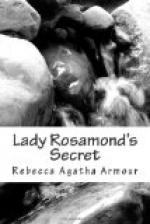Much more might be told in connection with those sad events, but as the details might not be acceptable to the reader, therefore we refrain.
Once more gathered in their home, the family of Sir Howard were not inactive. The spirit of charity was manifest in every action of those lovely girls. Mary Douglas and Lady Rosamond had formed a sewing circle, to which they invited some of their young acquaintances. In this charitable employment they spent many hours. Clothing was made and distributed with increasing demand. The severity of winter caused many poor people to look for assistance in every possible form. Gaiety was for a time forgotten. Festive parties and sumptuous array were set aside for the necessities of the season.
It is a well established fact that the miseries of others often alleviate our own. To none could this application be more forcible than Lady Rosamond. In her bitterness of heart she experienced a quiet relief in assisting her companions to provide clothing for the sufferers. The scenes through which she had passed counterbalanced the feelings she had hitherto experienced and taught her gentle resignation. Her thoughts were of a more serious nature—a source whence she derived much comfort. Her parent’s views were unaltered; her hopes were no brighter in the distant future, but, as afterwards expressed, she had more strength given her from the bitter trials of suffering humanity.
As Christmas drew nigh the inmates of Government House could not resist a desire to look back to the joyous season which they had passed in the home now laid low, its surrounding woods, their pleasant excursions, and the extensive preparations in decorating for the festive scenes that followed.
Pioneer Johnnie was loud in regrets for the apparent neglect which the sylvan deities must naturally feel by his temporary absence from their select and stately assemblages.
“Keep up your spirits, Master Johnnie,” once remarked Lady Rosamond, “the next time we go back the trees will recognize the compliment with music and grateful homage.”
“As none but you and Lady Rosamond regret being turned out, I presume,” exclaimed Charles Douglas, who was always ready to join any conversation that afforded amusement. He continued passing careless jokes until the clock in the hall reminded him of his business.
“Really, Lady Rosamond, I credit you with driving away dull care and my forfeiting all claims to the future good will of my friend Howe by disregarding his message. Pardon me, ladies, for having almost forgotten to say that the sleigh will be in readiness in half an hour.”
“Half an hour,” exclaimed Mary Douglas, somewhat hastily, “really, Charles, I cannot pardon you for such neglect, as it sadly interferes with my plans.”
“Come, little one, frowns do not become thy brow,” returned Captain Douglas, kissing the forehead of his sister.
“That is much prettier,” said he, pointing to the smiling face which in turn rested upon him.




